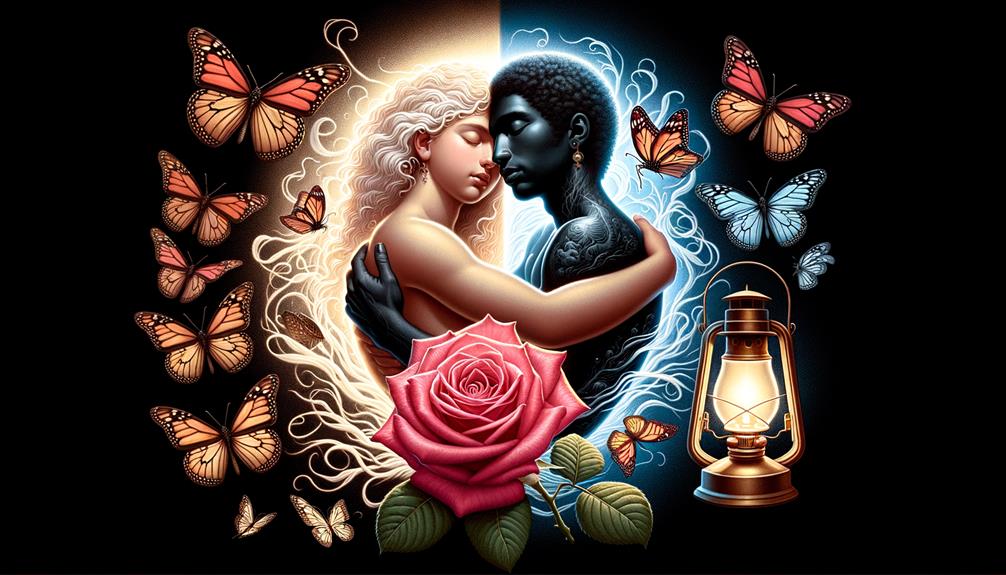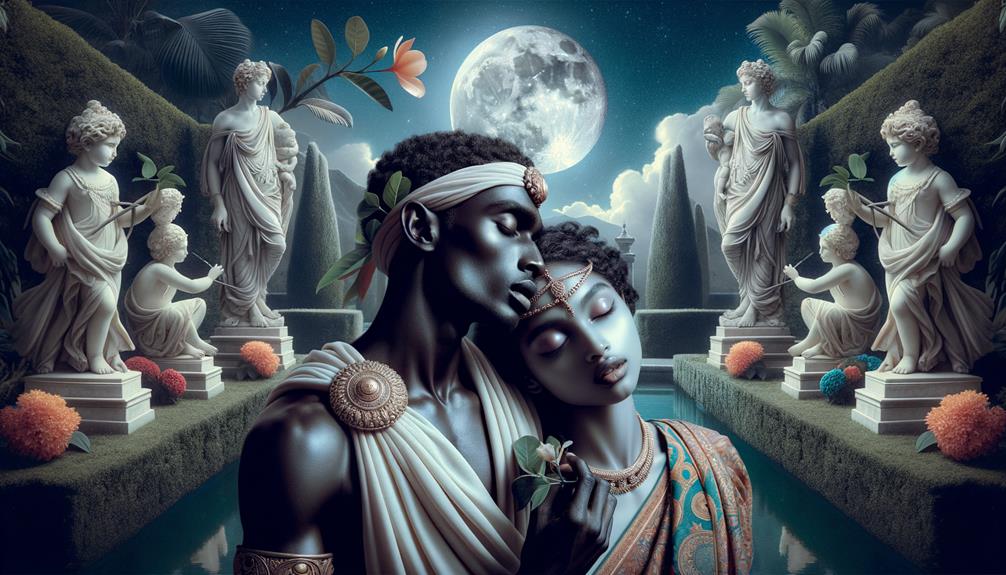Psyche's tale captivates us with its timeless struggle between hardship and redemption. This mere mortal's ethereal beauty sparked divine envy, leading to a tumultuous journey rife with obstacles imposed by a jealous goddess. Yet Psyche's resilience and undying belief in her love for Cupid shine through, mirroring our universal yearning for trust and connection. The myth's symbolism resonates deeply, reflecting our quests for belonging amidst adversity.
The Origins of Cupid and Psyche
The tale of Cupid and Psyche, originating from the ancient Roman novel 'Metamorphoses' by Apuleius in the 2nd century AD, weaves together a poignant story of mortal beauty, divine jealousy, and the triumph of love. Psyche, a princess of unrivaled loveliness, unwittingly incurred the envy of Venus, the goddess of love and beauty. In a surprising turn, Venus' son Cupid fell deeply for Psyche, defying his mother's wrath to rescue his mortal beloved from sacrifice.
Drawing parallels to the Greek myth of Perseus saving Andromeda, this narrative explores how love can conquer even the most daunting challenges. Over centuries, Cupid and Psyche's romance has inspired countless artistic interpretations, solidifying its status as an enduring and universally resonant myth.
The Trials of Psyche

Psyche faced unbelievable odds when Aphrodite threw arduous challenges her way. Yet, with steadfast love and resilience, she conquered each daunting task. These four trials pushed Psyche to her limits, testing her bravery and willpower.
| Task Number | Challenge | Mythical Aid |
|---|---|---|
| 1 | Sorting mounds of grains | Industrious ants lent a hand |
| 2 | Collecting golden wool | A whispering reed guided her path |
| 3 | Fetching water from the Underworld's river Styx | An eagle swooped in with its jar |
| 4 | Retrieving Persephone's beauty elixir from Hades' realm | A talking tower revealed the way |
Divine forces seemed invested in Psyche's success, offering supernatural assistance. Yet the final labor – stealing Persephone's fabled beauty cream – nearly broke her. Succumbing to temptation, she opened the forbidden box, instantly collapsing into a deathlike slumber.
This pivotal mistake ironically rekindled her love with Cupid. Psyche's perseverance symbolized undying love's power to overcome any trial. Her mortal-to-divine transformation reminds us that resilience can conquer extraordinary adversity.
Symbolism in the Myth

The myth of Cupid and Psyche conveys profound insights into the enduring bond between love and the soul through vivid symbolism. Cupid personifies love, desire, and attraction, while Psyche represents the soul's spiritual growth. Their narrative explores universal themes like love, trust, betrayal, and redemption. Cupid's divine nature juxtaposed with Psyche's mortal essence underscores the timeless connection between the divine and human realms.
Psyche's arduous journey symbolizes the complexities and challenges inherent in personal growth and relationships. Each trial represents a facet of love and its transformative power. Through perseverance, Psyche's mortal essence is refined, reflecting the psychological undertones of sacrifice and the pursuit of transcendence.
Trust and betrayal form a pivotal aspect of their story. Psyche's initial breach of Cupid's trust sets the stage for her redemption, mirroring the fragility of relationships and the necessity of trust. Ultimately, her redemption signifies not just self-discovery but the transformative capacity of love.
In essence, the Cupid and Psyche myth weaves a tapestry of symbols illustrating the profound interplay between love, the soul, and the journey toward spiritual fulfillment.
Cultural Impact and Legacy

The ageless myth of Cupid and Psyche has permeated pop culture, fueling countless artistic works, literary creations, and modern storytelling. Masters like William-Adolphe Bouguereau, Raphael, and Goya drew inspiration from this tale, capturing its essence on canvas. The narrative has reverberated through poetry, including John Keats' 'Ode to Psyche,' and influenced beloved stories like 'Beauty and the Beast.'
Rooted in Greek mythology, the Cupid and Psyche fable illuminates universal themes of love, sacrifice, and personal growth. As we delve into this ancient narrative, its impact resonates across centuries, captivating romantics and academics alike. Cultural juggernauts like National Geographic and NPR have spotlighted this enduring story.
This tale of a mortal's devotion to the God of Love's son, Cupid, speaks to our innate desire for connection and understanding. Its rediscovery during the Renaissance reignited a fascination with Latin literature and ancient lore, solidifying its place in our collective consciousness. The story's influence persists in modern American literature, a testament to the longevity of timeless myths.
Modern Interpretations

Modern interpretations of Cupid and Psyche unearth psychological dimensions, shining a light on our innermost fears and vulnerabilities. Thinkers like Sonia Sabnis challenge classic European depictions, highlighting how the tale's unsettling undertones mirror our own anxieties.
In 20th-century American literature, Richard Matheson's 'Button, Button' draws from these darker themes, unveiling how a simple choice can unravel human morality and relationships. Works like 'Rosemary's Baby' echo Cupid and Psyche's narrative, examining curiosity, deception, and loss of autonomy. These stories resonate with the existential dread pulsing through the ancient myth, delving into maternal anxieties and societal issues.
Contemporary takes offer fresh perspectives:
- Psychological Exploration: They peer into the human psyche, exposing our insecurities and darkest fears.
- Unsettling Elements: They underscore the story's intrinsic unsettling nature, prompting us to question norms.
- Universal Themes: They unpack timeless themes of love, betrayal, and self-discovery.
These modern adaptations provide a profound examination of enduring human experiences.
Frequently Asked Questions
What Is the Main Reason That Cupid and Psyche Fall in Love?
Cupid and Psyche's timeless love story captivates through adversity and triumph. Their destined union overcomes divine trials, intertwining their fates as icons of unwavering devotion. From a humble mortal's quest for her divine partner to their ascension as eternal beacons of unity, their journey resonates as a powerful embodiment of love conquering all.
How Did Eros and Psyche Fall in Love?
Eros and Psyche's romance sparked unexpectedly, their destinies intertwined through hardship. Against staggering odds, their enduring connection proved genuine love prevails, even for mortals and deities.
What Does the Story of Cupid and Psyche Teach Us?
The story reminds us that deep love can outlast any challenge. When we have faith and forgive wrongs, we can heal emotional wounds. Persevering through hardship leads to personal growth, sometimes with unexpected aid. At its core, the tale celebrates how loyalty and sacrifice build lasting bonds between people.
What Messages Does the Myth Cupid and Psyche Say About Love?
You know, love is no walk in the park. The Cupid and Psyche myth illustrates that reality perfectly. It depicts love as a journey fraught with challenges and hardships, emphasizing the power of trust and determination to overcome obstacles. Ultimately, the tale celebrates the personal growth and eternal bliss that come from weathering life's storms hand-in-hand with your partner. While many tout love as a cure-all, this ancient story reminds us that lasting bonds require effort, sacrifice, and an unwavering commitment to one another.


